Is there a racist component in camping? Or is it a question of common sense?
For a “white boy” who grew up middle class in the South, in the midst of the civil rights movement, I thought I had seen race relations improve dramatically since I was a kid. I still remember Black people being forced to sit at the back of the local Blue Motor Coach Line. But over the years I hopefully learned (and hopefully still possess) some decent values when it comes to racism, bigotry, and discrimination. I surely still have much to learn, but I’ve held to the hope and the belief that, at least, I have good intentions. At least I thought I did.
But these are trying times for us Caucasians. Absorbing the issues of race and racism, and all the many ways they manifest themselves across American Society in recent years, has become an overwhelming task. There are so many institutions and historical figures and activities that have been decried as “racist”, it’s hard to keep up.
I have always been a firm believer in the honest telling of our country’s history–warts and all. That dedication to the truth is why I also abhor the erasure of the more ugly aspects of our history, via the never-ending removal of monuments and statues that some feel glorify those ugly chapters in America’s past.
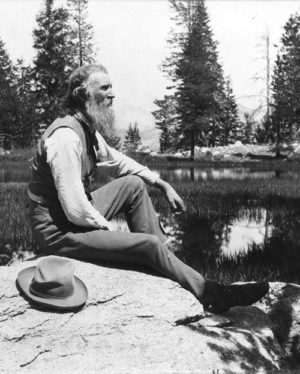
Environmentalism itself has fallen into the cross-hairs. It has come to be recognized as a nearly “whites-only” movement, embraced by spoiled upper middle class, college educated pale skinned do-gooders. No argument here. But its history and its iconic leaders have been similarly tarnished. The “Father of Environmentalism,” John Muir was recently labeled a raging racist for views he held over a century ago, and leaders of the organization he founded, the Sierra Club, are predictably considering measures to minimize their founder’s legacy. Its executive director Michael Brune, noted that, “As defenders of Black life pull down Confederate monuments across the country, we must…reexamine our past and our substantial role in perpetuating white supremacy.”
Author Prakash Kashwan, a researcher with the Human Rights Institute and Political Science professor at University of Connecticut, could not have been more blunt when he wrote in 2020:
“American environmentalism’s racist roots have influenced global conservation practices. Most notably, they are embedded in longstanding prejudices against local communities and a focus on protecting pristine wildernesses. This dominant narrative pays little thought to indigenous and other poor people who rely on these lands – even when they are its most effective stewards.”
Other legendary conservationists have come under fire, from Teddy Roosevelt to the artist James J. Audobon. Even Aldo Leopold has been linked to racist agendas for suggesting that overpopulation threatens natural processes on Earth.
My 40 years in Utah, and my involvement both inside and outside the state’s mainstream environmental organizations, bears out at least part of that premise. For sure, I can’t recall meeting a single paid environmentalist in all those years who wasn’t as white as I am, if not whiter. Recent efforts by the very wealthy mainstream environmental community to link themselves to Native Americans, in their effort to create Bears Ears National Monument and simultaneously claim a higher level of racial sensitivity, has felt shamefully contrived.
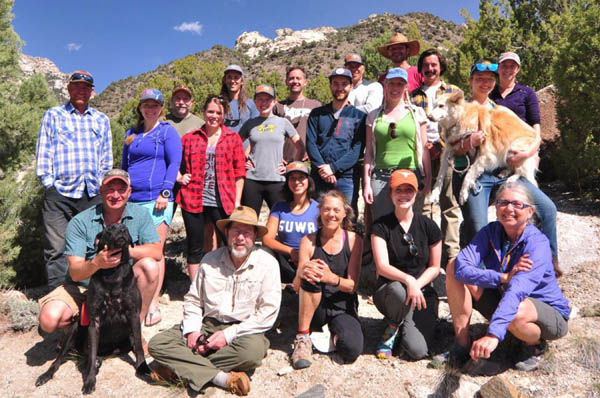
A 2016 story by Deseret News reporter Amy Joi O-Donohue bore out the idea that environmentalists’ interest in Native Americans had less to do with honoring racial diversity, and more to do with expediting their own agenda. Byron Clarke, vice president of the Navajo community group Blue Mountain Dine’, member of the Aneth Chapter of the Navajo Nation, and an opponent of the original monument proclamation, complained that, “The whole tone of it seems like the tribes are generally being used as pawns for the environmental groups to get what they really want,” Clarke said. “They are being played. It is somewhat insulting.”
In recent decades, environmentalist groups have focused their attention on promoting tourism as a sustainable economy for areas that used to rely on extractive industries. But now that the national focus has turned to issues of race, tourism has caught flak as well. Is the Great American Family Vacation a product of “white privilege?” Is tourism itself a shameful, blatant act of racism? Are we showing our white supremacist roots when we pitch the tent and fire up the Coleman stove?
It’s a fact that when I was a ranger all those years ago, I rarely encountered anyone but very white, middle-class Americans. Even they mostly looked out-of-place in the ‘wilds’ of Arches National Park. Most of the tourists were ill-prepared to deal with the difficulties of camping out. I was less focused on that lack of cultural diversity at the time, and more worried that they would get lost on the path to the bathrooms.
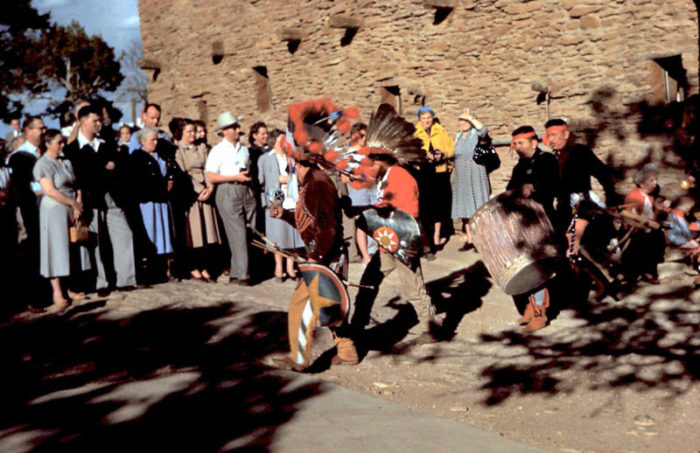
Still, in my decade as the campground park ranger, from 1976 to 1986, I encountered exactly one African-American camper. He was traveling alone, had arrived with a small tent in the late afternoon, and had set up camp in site #6. I still remember him well. He was a jazz musician from back east, I think Chicago, and had decided to check out the park because he’d heard stories about the excellent acoustics in some of the sandstone alcoves and canyons. He wasn’t really into camping otherwise. Someone, probably a white guy, had loaned him the tent and a sleeping bag.
I asked him what he thought of Arches. He shook his head and said, “Have Mercy!” He told me that it was hot as hell up here at the Devils Garden, that he had never seen such desolation, and thought I was crazy to work there. Every time I tried to explain why I had been in this Godforsaken place for almost a decade, he’d shake his head, slap his hand to his forehead, laugh and repeat, “Have mercy!” He was convinced that I was being punished for some past ranger screw-up and had been assigned here as a consequence.
I’d say, “No…I LIKE it here! I’m not being punished.” He’d laugh again…
“Have mercy.”
It was clearly his favorite expression and somehow the phrase stuck in my head too. A few days later, I was collecting fees when yet another camper stopped me to complain that the toilet was clogged up at Comfort Station #3. I heard myself reply reflexively, “Oh have mercy!” It surprised even me. A week later, I said it again.
For the last 35 years, I have probably stolen that line, “Have mercy,” at least once a week. Now I wonder if I may be accused of “cultural appropriation,” when in fact, it simply brings back a fond memory.
Later I showed him a quiet side canyon, just a couple minutes from his site. It had just the resonant sound he was in search of. I could hear the sweet music of his horn later, as it wafted over the slickrock and through the pinyon-juniper. When he finished, I would swear I heard him sigh softly and say, “Have mercy.” Maybe, in the cool of the evening, in that lovely grotto, he had decided this country wasn’t as godforsaken as he’d first thought.
*** *** ***
Going back many years, my Kentucky days were not the lily-white experience I would find in Utah. My first boss for my first job after college was an extraordinary woman named Mary Floyd. She had been an educator for decades, had retired, but then came back to become the director of the recently formed University of Louisville Day Care Center. I called her Mrs. Floyd once, but she insisted I be less formal. She said, “Child, you make me sound like a grandmother. Which I am. But call me ‘Mary’ anyway.”
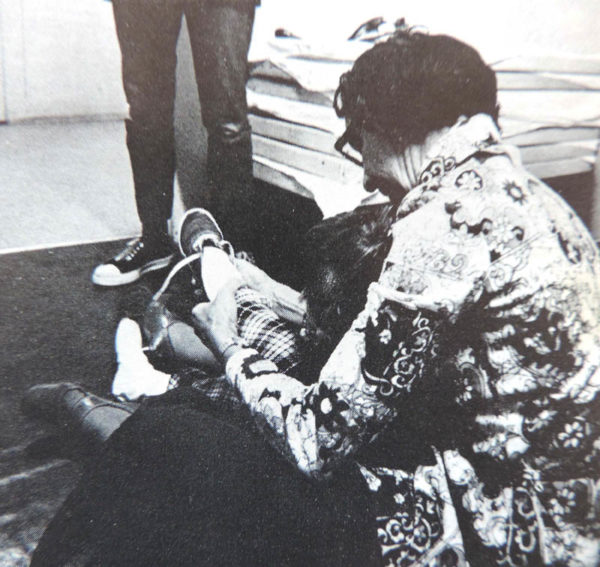
Mary Floyd was an African-American and born in Tennessee, but she had spent most of her life in Kentucky. Now, in her 60s, she was approaching the end of her long career. She had often talked of her childhood to me, during those peaceful moments called “nap time,” when the kids actually stopped moving for a while. I knew that she had grown up poor but I didn’t understand the depth of that poverty.
As we talked, she would often ask about my life as well. I was in my early 20s and just starting the journey. One day I told her about my “big dream” to move to the American West and I began to describe to her my love of camping. At first, she nodded pleasantly when I offered details of my outdoor adventures. But then I recounted a particularly memorable camping experience, one that happened the previous winter. I had been at the South Rim of the Grand Canyon with a friend in early January and, because I was nearly broke, our only sleeping option was to pitch our tent in the otherwise empty campground, to build a roaring fire in front of it, and hope that we neither froze nor burned ourselves to death before morning.
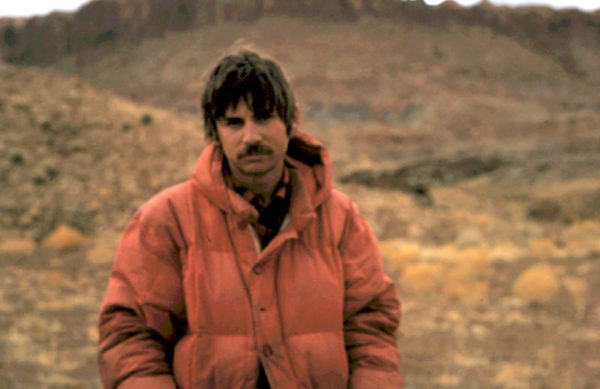
The fire’s warmth sustained us for about an hour, and by 6 AM frostbite was literally nipping at our toes. I told this story to Mary Floyd with unbridled enthusiasm. Listening, one might have thought I’d actually enjoyed my night out in bitter, minus-15 degree cold.
Mary leaned over and rapped her knuckles on the top of my head and said, “Child, there is something seriously wrong with your brain.” It was clear that Mrs. Floyd wasn’t sharing my sense of adventure, at least not this one.
She said, “What is wrong with you? Did your mama drop you on your head when you were a small child?”
I had to admit that bragging about frostbite and hypothermia would probably strike just about anyone as odd, but Mary Floyd wanted me to understand precisely why she thought I was slightly addled.
She said, “Let me tell you about where I grew up.” She paused a minute, gathered her thoughts, and then asked me, “Have you ever heard of Sergeant York?”
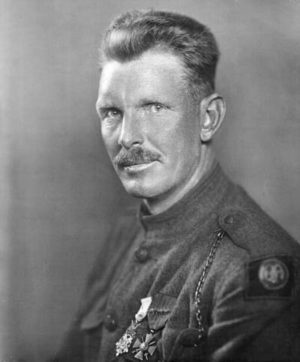
“I think so…” I knew the name. There was a Hollywood movie about a World War I hero named York. “Gary Cooper played him in the movie, right?”
She nodded and said, “Well Alvin York may have gone on to be a war hero, but he was just Alvin to us. He was our neighbor and if you wanted to know what ‘poor’ really means, all you needed to do was come down to Tennessee, to Fentress County, and take a look.
“Alvin was just like us…so poor we never knew for sure each night if we’d go to bed on an empty stomach or not. We all eked out a living as best we could, but the soil was poor and there sure wasn’t anybody who was going to help us. But we all worked together to stay alive.”
I asked her if there was a racial divide between black and white farmers like her family and the Yorks. Mary laughed and said, “When you’re that poor, child, nobody pays much attention to the color of your skin.”
The idea that Mary Floyd had grown up with the most celebrated soldier of the Great War was amazing to me. I asked her what Alvin York was like… Did he remind her of Gary Cooper?
“Honey,” Mary said, “Alvin York was the dumbest man I ever met in my life. Of any color. White folks knew it too. We’d all joke about how dumb he was. I was amazed that he could figure out how to tie his shoes, or which end of a fork to hold. And when he started drinking, oh Lord, he was about as bad as a man can get. Then he found Jesus and he gave up the bottle and his wild ways. But he was still dumb as a rock.
“But he was a good shot with his squirrel rifle, and that’s what made him a war hero, so he did okay in life.”
Then she added, “But YOU might be as dumb as Alvin, going out camping in the middle of the winter, because you thought it would be some kind of ‘adventure.’ We froze most nights when we were children and all we dreamed of was someday having a home that kept us warm and dry… Now you tell me, a smart boy like you seem to be, that you went out and tried to freeze yourself into some kind of coma. If I didn’t know better, I’d think you were just plain simple-minded!”
Then she burst out laughing and reached over and gave me a hug. Still I felt embarrassed. I started to apologize for being a stupid white kid and she just laughed. She promised she wouldn’t tell anybody how dumb I was and made sure to remind me that she knew a lot of dumb black guys as well, but she hoped I’d refrain from winter camping in the future.
“Just remember,” she added, “there’s a lot of folks who ‘winter camp’ every year and they don’t do it for fun. As for me, I sort of like my gas furnace and my air conditioner.”
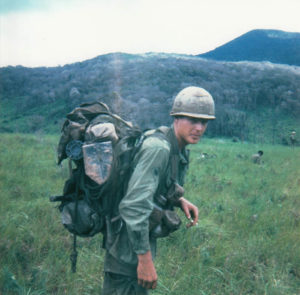
Later, when I thought about the paucity of African-American campers that I encountered over the years, I attributed it to their uncommon good sense, as opposed to some form of “white privilege.” We middle class idiots are entitled to camp out in the winter and suffer the effects of frostbite and we can camp out in the summer and endure heatstroke and the bites and stings of countless insects, snakes and scorpions. And yes, it is our “privilege,” but after that lecture from Mary Floyd, it hardly seemed like something to brag about.
And it reminded me of another occasion, at a wilderness hearing in Moab in the late 70s. A Vietnam vet named Joe Stocks stood up and offered a similar admonition. Joe was a white guy, from one of Moab’s original pioneer families, and he complained that in ‘Nam, he’d carried a sixty-five pound pack on his back for weeks at a time. He said that he could find no pleasure in it. Stocks was a uranium miner before his tour and came back to it when he was discharged. But he swore he’d never walk another mile in hot weather again, fighting off those hideous ‘no see ‘ums’ and monster mosquitoes, and especially with a load on his back. He concluded that all of us “backpacker hippies were crazy.”
Mary Floyd would have known exactly what he meant. Sometimes it’s not about race. Sometimes it’s just about ‘dumb.’
Jim Stiles is Founding Publisher and Senior Editor of the Canyon Country Zephyr.
To comment, scroll to the bottom of the page.
Zephyr Policy: REAL NAMES ONLY on Comments!
Don’t forget the Zephyr ads! All links are hot!

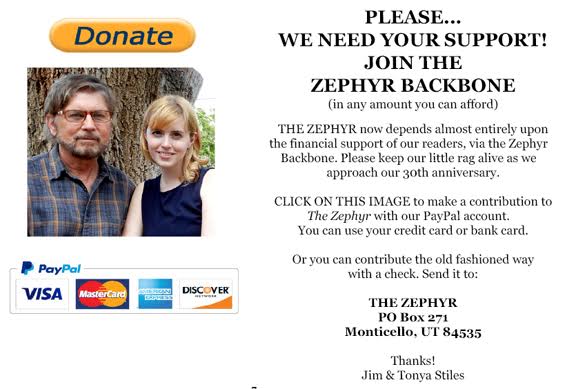
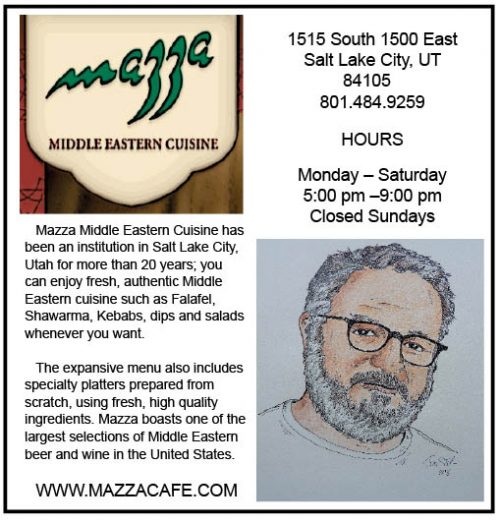

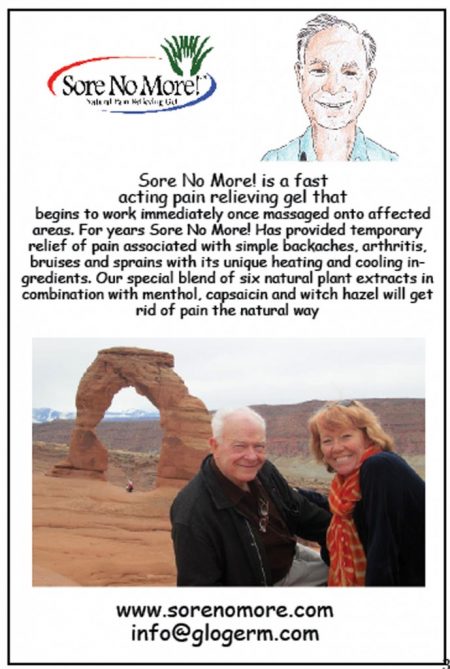
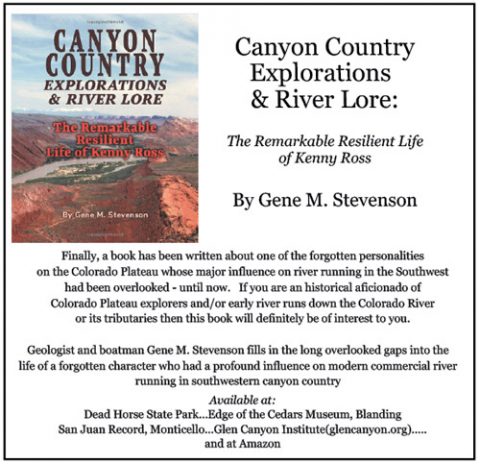
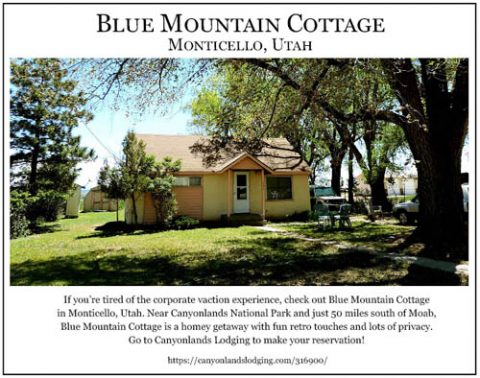
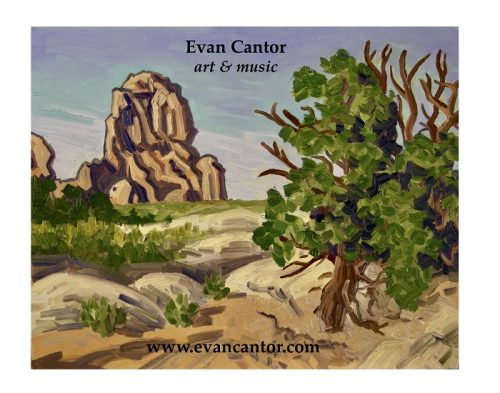
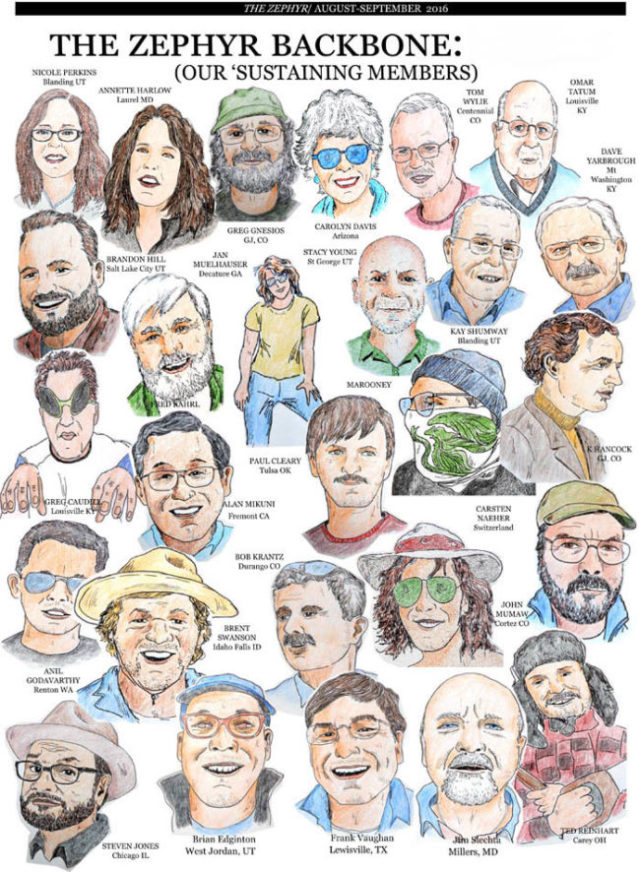
Even in the eighties in the Capitol Reef area old timers thought I was insane for winter camping, or really, camping anytime it wasn’t part of a job or hunt…camping just for pleasure was an absurd notion…also, I’ve been tramping the desert for decades and have never, ever, encountered an African american..not even as a Moab guide..I can’t even remember guiding anyone that wasn’t white…but, traveling the west half broke living out of a camp or truck might be an adventure for a white kid, but not for an African American kid…
Perspective is a relative thing. I spent decades of my life backpacking, mountaineering, rock climbing, kayaking and rafting. Loved it all and cherish those memories. Stepping back, many of those “adventures” seem like lunacy – frostbite, soaked and hypothermic, sleeping in a porta-ledge 1000 feet up a cliff, etc. etc. etc. It is, in essence, class privilege to do so. I don’t think it has much to do with color at all but with culture and disposable time and money. I know perhaps 3 black rock climbers from the 30+ years I was active, no hispanic or native american and not many more asian. Perhaps “white privilege” or culture or class gives us the security of material life or the boredom of that security to seek out that edge. I don’t know.
What a privilege to have known Mary Floyd. Such wisdom and honesty are in short supply these days. This brings back happy memories of our countless camping trips in the La Sals when I grew up a white, relatively poor child in Moab during the 1960s and 1970s. One aspect of our camping trips could be perceived as “privleged” if one doesn’t know the full story. We used to haul an old iron bed frame, complete with head and foot pieces, and a mattress, with us on our camping trips. This would be set up in Dad’s WWII era canvas tent for he an my mom. We kids would throw our blankets or bags or whatever under a nearby tree or in the back of the truck, without complaint. Were my parents the original inventors of glamping? No. My dad suffered from crippling, acutely painful rheumatoid arthritis, and the bed enabled him to pursue an activity he loved with less pain than sleeping on the ground. Camping is not the domain of any demographic, but it is a beloved pastime that makes its participants all the better for the delightful adversities they endure.
I think winter camping or other recreation has less to do with race and more to do with what you’ve had to do to survive. For several years, I had to use a snowmobile to check wells. I had way to much being cold, stuck and broke down with that chain saw on skiis. I hate those things and think anybody who voluntarily spends their winter weekends being cold is half a bubble off.
Use to winter camp on the Appalachian Trail in the Blue Ridge of Virginia. Wore the parkas, had the campfires, fired up the white gas stove, ate oatmeal and Mountain House. It was glorious. But I was young…in those days (the 70s), I wasn’t much concerned with the color of hikers and campers. I was more indignant over the fact that it seemed like hardly any girls were doing it. I wanted a girlfriend who would go backpacking–finally, after I had given up winter camping because the winter in Colorado is a different animal than Virginia’s, I found a backpacking woman.
Is there anything these days that ISN’T racist? Classical music is racist. Punctuality is racist. Merit is racist. The traditional family (Mon and Dad, etc.) is racist. Shakespeare is racist. Rational thought is racist. John Muir is racist. Math is racist. Are toilets racist? (Never seen a black one.) (OK, the latter is a weak attempt at humor.) And now seeing the USA in your Chevrolet might be racist. I could go on…..The same people who claim they are NOT racist seem to be the ones most obsessed with….race.
Jim, you say that “Even Aldo Leopold has been linked to racist agendas for suggesting that overpopulation threatens natural processes on Earth.” Really? As I see it, overpopulation of the earth is not linked to any particular racial group. In fact, it’s white people in developed countries who consume and pollute the most per capita. No, we don’t need fewer black people, Asian people, etc. We just need fewer people on the planet regardless of their skin color.